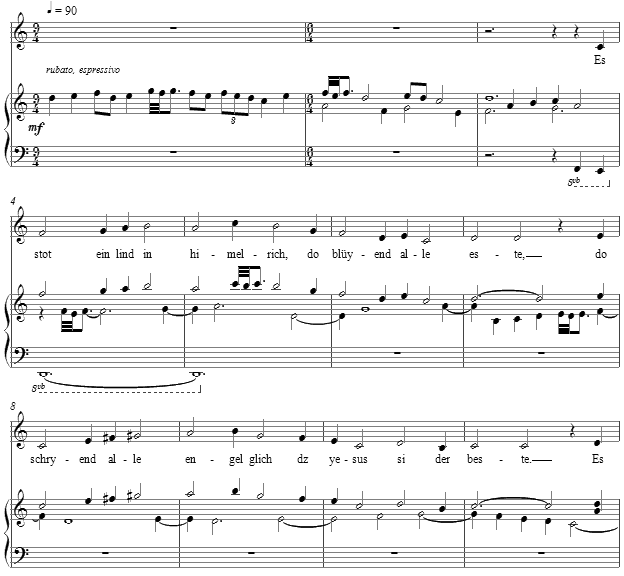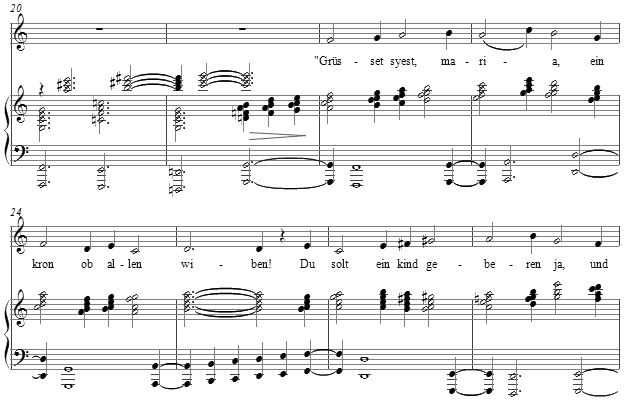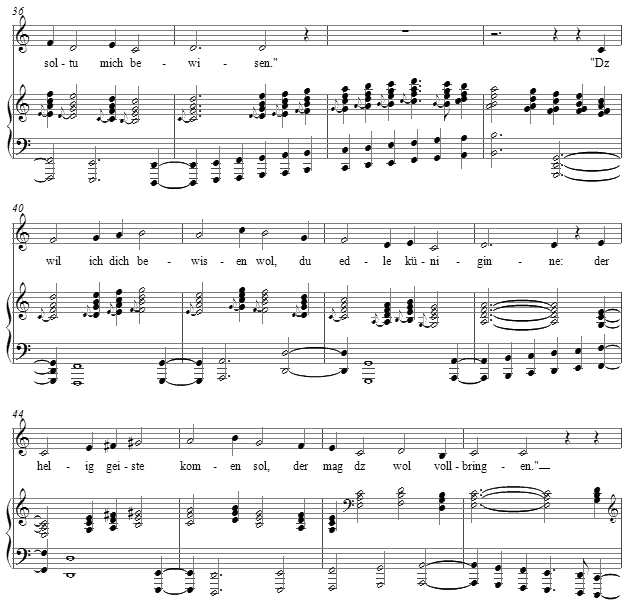Music and Texts of GARY BACHLUND Vocal Music | Piano | Organ | Chamber Music | Orchestral | Articles and Commentary | Poems and Stories | Miscellany | FAQs |
Es stot ein lind in himelreich - (1996)
Heinrich Loufenberg, died in 1465
for medium voice and piano
Es stot ein lind in himelreich,
do blüyend alle este,
Do schryend alle engel glich
dz yesus si der beste.
Es kam ein bott von himel vin
har uf dise erden,
Er gieng zu bschlossen türen in
und gruste die vil werden:
"Grüsset syest, maria,
ein kron ob allen wiben!
Du solt ein kind geberen ja,
und solt doch magt belyben."
"Wie kan ich gbern ein kindelin
und sein ein maget lyse?
Nie mans begert das hercze min,
des soltu mich bewisen."
"Dz wil ich dich bewisen wol,
du edle küniginne:
Der helig geiste komen sol,
der mag dz wol vollbringen."
Gabriel kert wider hin
zu der himel porten,
"Ich bin ein dirn des herren min,
mir gscheh nach dinen worten."
Gabriel kam wider in,
er seit gar gute mere,
Dz maria maget vin
gottes muter were.
Gabriel kam wider ab
und behutz vor allem schmerczen.
Maria, die vil reine magt,
trug got in irem herczen.
From a manuscript of Loufenberg's poems, formerly at Strasbourg, Stadtbibliothek (Cod. B. 121, f. 37[v]); published by Philipp Wackernagel, ed., Das deutsche Kirchenlied, Leipzig, 1867, Vol. II, no. 789. The manuscript was destroyed in 1870. (See Richard Müller, Heinrich Loufenberg, eine litterar-historische Untersuchung, Berlin, 1889, pp. 59, 90-91. The translation below is credited to Otto Zausmer, and drawn from A Christmas Book, edited by Eleanor Sayre, 1966, Clarkson N. Potter, Inc, New York.
[A linden tree in heaven stood -- its branches all in bloom;
and in one voice the angels cried that Jesus is the best.
A messenger from heaven came down here to earth.
He went through doors though they were fast, and greeted the most worthy one.
"Greetings, O Mary, crown of all women,
thou shalt bear a child and verily a Virgin shalt thou remain."
"How shall I bear a child and still remain a Virgin?
My heart does not desire any man; how can this be you show me?"
"How can this be I will make known to you, O noble Queen;
the Holy Ghost will come and will surely make it come to pass."
Gabriel returned to the gates of heaven.
"I am the handmaid of the Lord, and may it to me be according to His word."
Gabriel came back again. He brought good tidings that Mary,
the fine maid, would be God's mother.
Gabriel came down again and shielded from all pain Mary,
that most pure maiden, who bore the Lord under her heart.]
The setting is seemingly simple, echoing parallelism from the medieval and Renaissance, but it gently moves into polytonal dissonances suggestive of a modern approach to this older musical style. The opening gesture begins as monophonic, then to a two-voice texture, and the first accompaniment to the voice continues this seeming simplicity. The tessitura is not broad, and the piece is also recommended for a unison choir of boys or women's voices.
Succeeding verses allow the accompaniment to broaden into more voices, drawn from later music, with the appearance of the angel in parallel four-note chords in closed position.
Moving forward from this texture, the accompaniment becomes "arpa" as the widely spaced chords now require this articulation. The setting moves beyond this to more dissonant, polytonal harmonies as the tale unfolds in the text from the simple to the complex.
The score is available as a free PDF download, though any major commercial performance or recording of the work is prohibited without prior arrangement with the composer. Click on the graphic below for this piano-vocal score.


